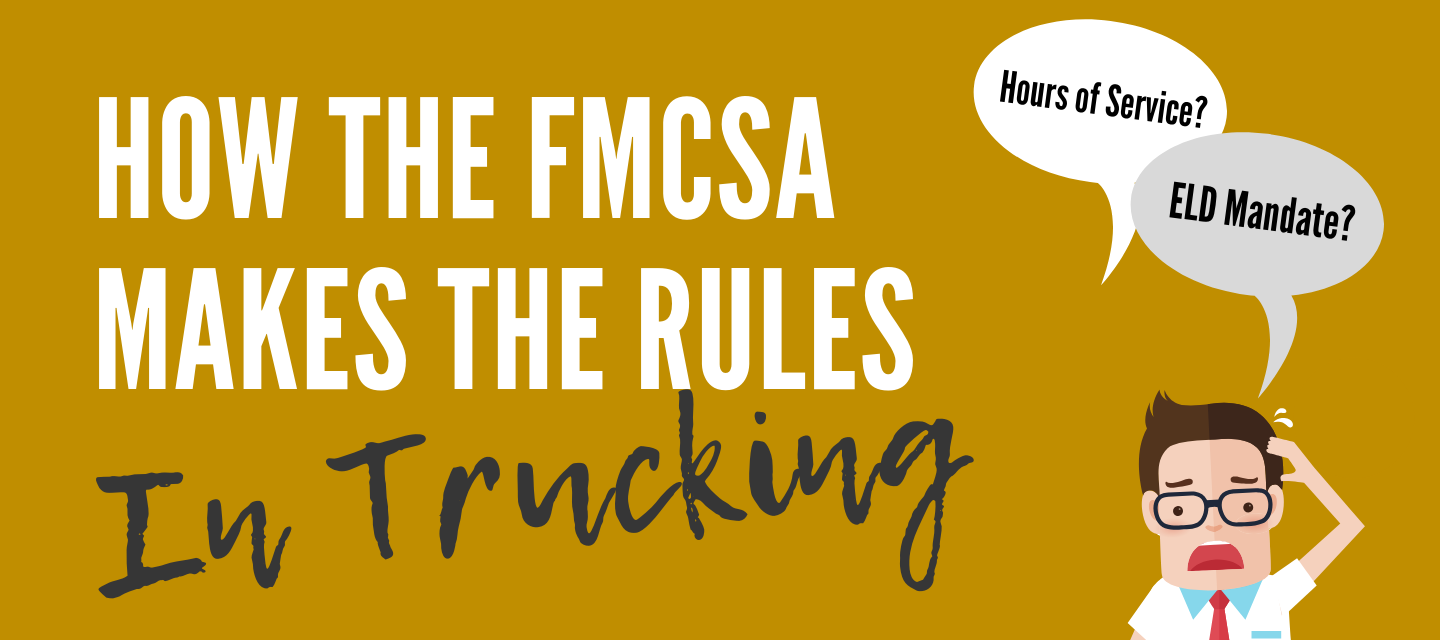How Does the FMCSA Make Rules in Trucking

Many drivers, and most people who work in trucking, have no idea how rules like hours of service or the ELD mandate are made by the FMCSA. We have a passion to change that because we believe that having this knowledge is vital to our livelihoods. We've divided this article into two parts. The first part is a quick overview and the second is a deeper dive into the process.
We encourage you to read both and share this information with others in the trucking industry.
What is the FMCSA?
The FMCSA is an administrative agency under the Department of Transportation in the United States. This agency was established in 2000 and was tasked with reducing crashes, injuries, and fatalities involving large trucks and buses. To do this, the FMCSA has been given rule-making authority pertaining to these objectives. The FMCSA is involved in making (and adjusting) rules such as the ELD Mandate and Hours of Service regulations.
In a nutshell the FMCSA makes the rules that the DOT enforces with drivers out on the road.
Quick Overview Infographic
.png?width=800&name=Work%20from%20the%20outside%20in%20when%20using%20cutlery%20(1).png)
Rulemaking Deep Dive
How Does the FMCSA Make Rules?
The FMCSA asks for public input on the front end of their rulemaking process. They put out requests for public comment and during that period drivers, trucking companies, special interest groups, and the general population can comment on what they think the rule should include.
After this initial period they enter a period of review where they internally comb through all the comments and contact people for follow up questions. They also hold special interest meetings and focus groups during this time. The FMCSA writes the proposed rules during this time.
When a new rule is completely written, the FMCSA has to send the rule to be published in the Federal Register. The Federal Register is essentially a government newsletter that is published daily and publicly presents all proposed legislation or rulemaking.
This process is called presenting a Notice of Proposed Rulemaking. It is required for any rule created by the FMCSA. The FMCSA publicly publishes the proposed rule and then seeks public comment for a period of 30 - 60 days, depending on the importance of the rule.
During this comment period people can either send an electronic opinion, hand deliver their opinion to the FMCSA, or send the comments in by mail.
After this comment period expires, the FMCSA is required to look at all the comments and address those specific concerns when they publish their final rule. This often means small tweaks to the proposed rule, or language of the proposed rule. If the comment period brings up major concerns that require more significant changes to the proposed rule then the FMCSA usually will issue another Notice of Proposed Rulemaking and have another comment period.
How is the Rule added to the Federal Code?
Once the FMCSA has read through and addressed all of the issues put forth in the public comments they will create a document with the final rule and their reasoning behind the rule. This final rule and accompanying report appears in the Federal Register as well.
If there is no further steps taken by the public then this rule is added to the Federal Code.
When is the Effective Date of the Rule?
The effective date of the rule depends largely on the content of the rule, opinions from concerned parties during the comment period, and the opinion of the agency itself. If the rule is expected to be difficult or costly to implement then there is usually a waiting period, often of a year or more.
Some rules, that are more minor, or that are created to address a timely issue, will be made effective more quickly.
Does Congress or the President Review the Rules?
This is a difficult question to answer fully. Because the FMCSA is created as a rule-making body by act of the Congress, they are allowed to make rules and regulations and add them to the Federal Code without having to go through the traditional processes of most laws. However, before an agency-created rule can take effect, the FMCSA must submit information to Congress and the Comptroller General and allow them time to respond.
Congress and the Comptroller General receive a copy of the rule, the proposed effective date and a summary of the rule as well as whether the rule is a major or minor rule.
"Within 60 days after Congress receives an agency’s rule, excluding periods when Congress is in recess or adjournment, a Member of Congress can introduce a resolution of disapproval that, if adopted by both Houses and enacted into law, can nullify the rule, even if it has already gone into effect." (Congressional Research Service, The Federal Rulemaking Process: An Overview)
Generally Congress and the President defer to the opinions of those placed in charge of federal agencies, but in cases of particularly unpopular rules, members of Congress have 60 days to introduce a resolution of disapproval. If this resolution is passed in both the House and the Senate then it is de-codified. The President also has the opportunity to veto this resolution of disapproval effectively keeping the rule codified.
Congress also will occasionally show disapproval of a law by defunding the enforcement of all or part of that rule, thus rendering it ineffective.
What Can Truckers Do About Rules that Are Already Codified?
Talk to your congressional representatives about your dissatisfaction. Talk to the FMCSA about your disapproval. In some cases, you may also join special interest or lobbying groups who will petition on your behalf.
The Takeaway
All throughout the process of creating rules and regulations, and even after the rules are codified, there are anti-trucking special interest groups lobbying for the attention of both legislators and the FMCSA. Many of these groups are funded by big businesses, insurance companies, and those who have very little interest in the lifestyle and opinions of professional truck drivers.
These groups will and do get the ear of these agencies. While the agencies arguably try to get a well-balanced view of the issues at play in our industry, if average drivers stay silent, then they are forced to listen to the loudest voices in the room.
If you take away one thing from this deep dive into the processes behind the FMCSA's rulemaking, please remember this. Your voice matters during FMCSA processes. Please involve yourself in the process of rulemaking in our industry. If you don't, we can guarantee someone else will.
Want to learn more about K & J Trucking, click below!

